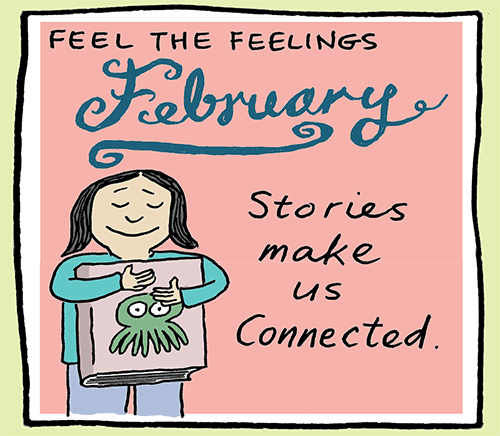
Feel-The-Feelings February:
Stories Make Us Connected
(And calendars sometimes make us confused. I started my Laureate time in March 2018, so I didn’t get to write about January till eleven months later.)

Stories are full of feelings. Characters have them about their problems, their friends, their enemies and themselves. And we share these emotions as we read. It’s called empathy. In our own lives, empathy is one of the things our friends really like about us. It’s also the best hope we have of our species’ survival.
I jotted down those thoughts a year ago when we launched the laureate calendar. Since then, as I’ve travelled the land haranguing people about the power of stories to change the world, particularly in the hands and minds of young people, my Exhibits A and B have been emotion and empathy.
And now Feel The Feelings February has come around again. Which seems a good time to dig into those thoughts a bit more and give a grateful nod to some of the ways stories make us connected.
I love writing about characters who, on the surface at least, are different to me and most of my readers - cane toads, nose germs, intestinal worms, kids who give up their business class seats to people with sore backs, teenagers who can ride a horse and shoot a rifle at the same time. And sometimes they’re different on a deeper level too. Unusually brave characters, for example, and unfailingly optimistic ones, and characters capable of huge unselfishness and sacrifice.
But even as these characters are doing heroic things in swamps and nostrils and on battlefields and horseback, places where I just don’t function well, they’re having pretty much the same feelings I have in the places where my heroic moments occur. (The supermarket carpark, mostly, and under the sink in the kitchen.) And my feelings mesh with theirs, and lo, we are one.
Ditto with the camel protectors and sports prodigies and teenage parents in my stories, and the kids whose bodies work differently, and the families who risk everything for each other. This simple sharing of familiar feeling, no matter how unfamiliar the context, brings us together like nothing else.
And so my Feel The Feelings February proposition is this. That people whose childhoods are filled with stories and shared feelings, whose adult lives are rich with the resulting empathy, are far less likely, should extreme power come to them later in life, to mentally strip entire communities of their humanity and condemn them to brutal suffering or even death.
And my suggested Feel The Feelings February activity? Brace yourselves, this is quite a big ask.
1. Work out what you spend on books in a typical February.
2. Spend that amount on books this February. If possible, ones that are even better-endowed than average with shared-feeling moments.
3. Send those books to individuals who have come to your attention as being in possession of both extreme power and the capacity to carry out the humanity-stripping activities outlined above.
4. Include a nice note and a library card.
5. Be as unfailingly optimistic as you can. (A child might be able to help here.)
May the February be with you.
Happy reading and writing, and speaking truth (and giving nice things) to power,

